- Home
- Troy Denning
Star Wars®: Dark Nest I: The Joiner King Page 30
Star Wars®: Dark Nest I: The Joiner King Read online
Page 30
“How strange.” Formbi continued to watch the Woodoos. “My file lists his age as seven.”
“Ben is withdrawing from the Force right now.” As much as it pained him, Luke had no intention of hiding the fact. That would have implied he was ashamed, and he was not. “We don’t know why.”
Formbi turned. “I didn’t know children could do that.”
“Most can’t,” Mara said. “Ben demonstrated exceptional power from birth. This only confirms how gifted he is.”
“I see,” Formbi said. “I’m sorry, then, that he is choosing not to develop his potential.”
“We’re not,” Luke said. He felt Mara’s ire rising, but the smile on her face remained polite. Winning Formbi’s cooperation was going to be difficult enough without allowing Chiss manners to become an issue. “Children must want to be at the academy to succeed. We don’t force anyone to attend, and we do everything we can to encourage them to enjoy their time here.”
“We can even arrange employment for their parents on Ossus—some are assistant trainers here at the academy,” Mara said. “And we encourage students to develop at their own pace. So when Ben is ready, his natural capabilities will allow him to establish himself very quickly.”
“I have no doubt.” Formbi turned back to the training grounds, looking past the Woodoos to where the Rontos were practicing telekinesis by smashing giant bean bags against each other. “But I’m sure you didn’t summon me here to discuss Jedi training techniques.”
“As a matter of fact, we did,” Luke said. They had also asked Soontir Fel to come, but he had politely declined, explaining it would not do for anyone on the Defense Fleet general staff to consort with Ascendancy enemies. “We want you to understand what goes into the training of a modern Jedi.”
“Hoping to impress me so much that I’ll persuade the Ruling Circle to let you handle the Qoribu problem?” Formbi asked.
“Precisely,” Mara said. “And it was an invitation, not a summons.”
“Funny,” Formbi said. “Your message mentioned the Brask Oto.”
“That’s right,” Luke said. The Brask Oto was a Chiss battle station he and Mara had saved during an earlier trip into Ascendancy territory. “We wanted you to know it was authentic.”
Formbi smiled. “As I said—a summons. We Chiss always repay debts of honor.” He waved a hand toward the interior of the training complex. “Please, impress me.”
Luke led the way across the running track to the slidewalk that circled the inner fields, then heard an alarmed whistle behind them. He glanced back to find R2-D2 traversing a banked turn, one tread off the ground and perilously close to tipping over.
“Your droid seems rather intoxicated,” Formbi observed.
“A memory fault is playing havoc with his systems.” Luke reached out in the Force and carried R2-D2 over to the slidewalk. “I don’t want it repaired until we find a way to extract some information stored on the chip.”
Formbi watched with an amused expression as the droid settled onto the slidewalk behind him. “And this information is so valuable you must keep the droid with you at all times?”
Luke thought for a moment, then said, “Yes.” The truth was that R2-D2 kept scheduling himself for a chip replacement, so Luke had decided to keep him nearby until the Galactic Alliance’s best slicer, Zakarisz Ghent, arrived to bypass the security program protecting the memory chip. “It could solve a very old mystery for us.”
“Then I wish you luck,” Formbi said. He pointed to a circle of twelve-year-olds—Banthas—sitting cross-legged around a single happy-looking nerf, waving their fingers and sending the contented beast waddling back and forth among them. “What in space are they doing?”
“Mind tag,” Mara explained. “It’s how they develop their persuasive abilities.”
Formbi gave her a sharp look. “I trust that’s not how you intend to persuade me?”
“The technique only works on the weak-minded,” Luke said. “And no Jedi would ever consider a Chiss Aristocra to be weak-minded.”
“Good,” he said. “I was given to believe Jedi Knights are rarely fools.”
“We generally try to train that out before anyone becomes a Jedi Knight, yes,” Mara said.
“Then why do you insist on involving yourselves at Qoribu?” Formbi’s voice was casual, as though it were only an idle question. “The conflict is of no concern to the Galactic Alliance.”
“The Jedi serve the Force.” Luke was keeping an eye on R2-D2, making sure he did not wander off. “Our concerns reach well beyond the Galactic Alliance.”
Formbi’s gaze grew hard. “Into the Ascendancy?”
“Into the Colony, at least,” Luke said.
Formbi looked away, focusing his attention on a group of fourteen-year-olds who were using their lightsabers to bat live blaster bolts back and forth. These students had no nickname; once students built their first lightsabers, they were known simply as apprentices.
“You understand nothing about the Colony,” Formbi said, almost absently. “If you did, you would leave it to us.”
“We understand that what you’re doing at Qoribu comes close to violating Chiss law,” Mara said. “Unless the Ascendancy has bent from a thousand years of tradition?”
“A lot has changed in the Ascendancy.” Formbi’s voice grew resigned. “But not that. It remains unlawful for the Chiss to be the aggressor people.”
“I’ve always admired that about the Ascendancy,” Luke said.
“In truth, I find it rather quaint,” Formbi replied. “But, having no desire to find myself exiled, I’ll follow the law—even if it means the destruction of the Ascendancy itself.”
A line of ten-year-old students appeared ahead, racing toward Luke and the others against the flow of the slidewalk. Formbi started to step aside so they could pass, but Mara used the Force to gently tug him back.
“Please, Aristocra,” she said. “They’ll be disappointed if we rob them of their chance to show off.”
Formbi eyed the chubby Kitonak girl at the head of the line, then cocked his brow when she suddenly sprang off the slidewalk, turned a Force flip over his head, and landed gracefully—if somewhat heavily—behind him. The rest of the students followed suit, beaming in pride as they somersaulted over Luke and the others. Once Formbi grew accustomed to the game, he even encouraged the students by pretending to flinch before each one jumped.
“Thank you for indulging them, Aristocra,” Luke said. “The dining halls will be buzzing tonight with how they actually drew a reaction from you.”
“My pleasure,” Formbi said. “As long as they understand the difference when they become Jedi Knights.”
“They will,” Mara said. “Chiss courage is legendary around here—which is why I’m so puzzled about your fear of Killiks.”
“If you are puzzled, it is only because you are ignorant of the Colony’s true nature.”
“Then enlighten us,” Luke said. “The sooner the Jedi understand the situation, the sooner we will find a solution and end our presence at Qoribu.”
“And if there is no solution?”
“It would be better to discover that now,” Luke said, “before any more of our Jedi become like Raynar.”
Formbi frowned. “Who is Raynar?”
“Raynar Thul,” Mara said. “He went MIA during the war. He was presumed dead, but apparently his ship crashed inside the Colony.”
“A nest of Killiks rescued him and saved his life,” Luke said.
“Saved his life?” Formbi sounded surprised. “When did this Raynar come up missing? About six years ago?”
“Close.” Luke began to have a sinking feeling. “It was a little over seven.”
“I see.” Formbi’s gaze turned inward. “That explains it.”
“Explains what?” Mara demanded.
“The Defense Fleet reconnaissance corps has been watching the Colony for centuries,” Formbi said. “It has been slowly expanding over time, but it wasn’t considere
d a threat.”
“Until recently,” Mara surmised.
“Correct,” Formbi said. “The insects—Killiks, as you call them—are clearly intelligent, but they’ve customarily shown little concern for life. When one was injured, its companions would simply abandon it, and when food grew scarce, whole columns would just wander off to die.”
“And that changed six years ago,” Luke said.
Formbi nodded. “The first satellite nests appeared on our border, and we began to notice an exponential population increase. Imagine our surprise when we learned that now they had hospitals to care for their ailing and were using interstellar trade to alleviate the cyclic food shortages that once kept their populations in check.”
“And that frightened the Ascendancy into sending your defoliators to give nature a helping hand?” Mara asked.
“No.” Formbi accepted the criticism in her question without visible emotion. “We didn’t make that decision until later—after we had discovered how dangerous they were.”
The slidewalk carried them past a sunken basin, where a group of adolescent apprentices stood meditating under the watchful eye of a training Jedi Knight. They were surrounded by twenty grown adults, who were shouting insults at them and pelting them with missiles ranging from kitchen leftovers to sting balls.
“My word!” Formbi gasped. “What kind of drill is that?”
“It’s a centering exercise,” Luke said proudly. He was counting on this part of the tour to persuade Formbi to speak on their behalf on the Chiss capital world, Csilla. “Young Jedi must learn to detach themselves from their emotions, to remain focused regardless of whatever they are feeling at the time.”
“There are several other versions,” Mara added. “A five-day fast while the rest of the academy feasts around them, a three-day swim in a warm bubble pool, an all-night tickle where they’re forbidden to laugh.”
“That may sound silly, but that’s actually the most difficult test,” Luke said. “And if they fail, they repeat the other exercises.”
Formbi stared at them as though they had told him they were Sith Lords. “You people make the Ssi-ruuk look kind!”
“Jedi Knights often find themselves in tumultuous situations,” Luke replied. “Their judgment must remain sound, no matter what they are feeling.”
“Sound judgment is a warrior’s best weapon,” Formbi agreed. “Though I don’t understand what the Jedi have against laughing.”
The slidewalk carried them past the centering exercise, and R2-D2’s presence began to fade. Luke looked back and, finding the confused droid facing the wrong direction, used the Force to lift him back to the group.
Mara was already grilling Formbi again. “…convinced the Ascendancy the Killiks are dangerous?”
Formbi hesitated a moment, then asked, “Do you recall our first meeting, when I welcomed you aboard the Chaf Envoy to examine the wreck of the Outbound Flight?”
“How could we forget?” Luke said. “The whole mission was a gambit to lure the Vagaari into attacking, so you could carry the war to them legally.”
“The choice was theirs,” Formbi said defensively. “But yes. And do you happen to remember how many ruling families there were at the time?”
“Nine,” Mara said instantly. When it came to politics, she rarely forgot a fact. “But five years later, when we visited Csilla, the number was four. I assumed the discrepancy to be a result of a war with the Vagaari.”
“Not directly,” Formbi said. “But the Third Vagaari War did leave us with a labor shortage, and that led to the discrepancy.”
“I’m afraid I don’t understand,” Luke said. “Were the losses of some families so heavy—”
“Several families began to hire entire nests from the Colony. It seemed the perfect solution. The insects were plentiful, industrious, and not averse to risk. This was a couple of years before your Raynar arrived, and they began to care about surviving.” Formbi winced at how that sounded, then hastened to add, “Of course, we were careful not to take advantage.”
“Of course.” Luke had the unhappy feeling that he saw where this was leading. “Didn’t you know about the Joiners?”
“We took precautions,” Formbi said. “Very stringent precautions.”
“That still didn’t work,” Mara surmised.
“They worked,” Formbi replied. “Until someone started sabotaging them.”
“The Killiks?” Luke asked.
Formbi frowned. “We value fools no more than the Jedi, Master Skywalker. The precautions remained solely under our control.”
There was a moment of silence, then Mara asked, “And?”
“We don’t really understand,” Formbi admitted. “It may have been interfamily rivalries. All we know is that the precautions broke down, and before we realized it, two entire families had become Joiners.”
“Only two?” Luke asked. “What about the other missing families?”
“Three of the families had become critically dependent on insect labor,” Formbi replied. “There was a dispute over the best course of action.”
“The Ascendancy had a civil war?” Luke gasped.
“Chiss do not have civil wars, Master Skywalker,” Formbi replied. “We have disagreements. The matter was resolved before your visit to Csilla—though I do believe you were witness to some reverberations.”
“The attack on Soontir Fel?” Mara asked. “I thought that concerned the aid he provided the Galactic Alliance against the Yuuzhan Vong.”
“It is easy to disagree with the policies of someone who has destroyed your family,” Formbi said. “Fel has a habit of being too merciful for his own good.”
The slidewalk carried them to the training field that had been Luke’s destination all along, a jumbled course full of traps, hazards, and obstacles. Two teams of senior apprentices—one team large and strong, the other small and quick—were running back and forth through the course, using long-handled rackets, stun-blasters, and Force telekinesis to pass half a dozen crackling jet-balls to each other through the air. In the midst of the crashing bodies and acrobatic power plays, a single referee was struggling to maintain order.
Motioning Formbi and Mara along, Luke stepped off the slidewalk—then reached out with a mental hand and pulled R2-D2 to his side. Luke did not launch into a description of the game, however; he still had some questions about the trouble the Killiks had caused the Chiss Ascendancy.
“I’m beginning to see why the Ascendancy doesn’t want the Colony encroaching on its frontier,” Luke said. “Were the Killiks also responsible for the destruction of the Empire of the Hand?”
Formbi turned and, in a surprised voice, asked, “What makes you think the Empire of the Hand has been destroyed?”
Luke wasn’t fooled for a moment. He could feel the Aristocra’s dismay through the Force—and so could Mara.
“Baron Fel, for starters,” she said. “He wouldn’t have abandoned his duties while the Empire of the Hand stood.”
“Perhaps it was merely absorbed,” Formbi suggested.
“After being battered into nothingness,” Mara said. “We know that Nirauan has been abandoned. Something must have happened.”
Formbi sighed in resignation. “The Empire of the Hand served the purpose Mith’raw’nuruodo intended—though it was not against the Colony, as you suggest.”
“The Vagaari, then?” Mara pressed. “The Yuuzhan Vong?”
“That’s really all I am at liberty to say,” Formbi answered wearily. “Except, perhaps, that the Colony is only one of the Terrors remaining to the Unknown Regions. Do not be surprised to see the Empire of the Hand rise again, when there is need.”
“I see,” Luke said, saddened to have confirmed what he had only suspected until now. “I know that three of the Fel children survived, but what of Chak—”
“Only two survived,” Formbi said. “Jagged and Wyn. Chak, Davin, and Cherith are all dead.”
“I’m sorry to hear that,” Luke said. “I liked
Chak very much.”
“But what of Cem?” Mara asked, picking the question off the top of Luke’s head. “Was she killed, too?”
“Cem?” A sly smile came to Formbi’s mouth. “Cem is a son’s name.”
“Excuse me,” Mara said. “We never actually met.”
“I should think not.” The smile grew wider and shiftier. “Cem would be the Fels’ shadow child.”
“Shadow child?” Luke asked.
“Publicly unacknowledged,” Formbi explained. “Secret, in fact. It’s a common Chiss precaution to keep enemies from wiping out an entire ruling family.”
Luke began to have a guilty feeling in his stomach. “How secret?”
“Quite,” Formbi replied. “In fact, this is the first time I’ve heard of a Cem Fel. I imagine you heard the name from Wyn.”
“Jacen did,” Mara replied. “How could you know?”
“Wyn is notorious for spilling secrets,” he said.
“And now we’ve compounded it,” Luke said. “I hope you’ll hold the name in confidence.”
“Of course.” Formbi’s voice was sincere. “And you shouldn’t feel bad—Soontir Fel is a clever one. I often suspect that Wyn reveals only what he wishes her to.”
“Thank you.”
Luke returned the smile, hoping to conceal his doubt about the Aristocra’s reassurances. He waved at the training field, where the small team had won control of all six jet-balls and was driving deep into opposition territory. “And now, perhaps you’d allow me to explain the game we’re watching.”
“Please,” Formbi said. “It looks refreshingly riotous.”
“We call it Skorch,” Luke explained. “It’s actually the referee who’s being trained. Each team has a set of secret goals—such as collecting three balls or sending two into one goal and one into another—and it’s the referee’s job to discover those goals and see that both sides win.”
“If that’s possible,” Mara said. “In some Skorch scenarios, the goals are mutually exclusive. Then the referee must see that both teams achieve an equivalent level of victory.”
The referee, a black-furred Defel with eyes as red as Formbi’s, popped up from behind a wall and sent a small Rodian sprawling. He intercepted the jet-ball that had been coming in her direction and sent it sailing toward the other end of the course.

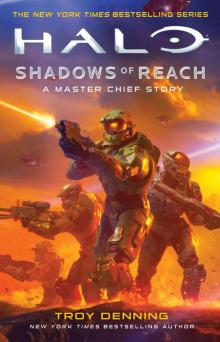 Shadows of Reach: A Master Chief Story
Shadows of Reach: A Master Chief Story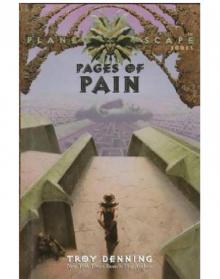 Pages of Pain p-1
Pages of Pain p-1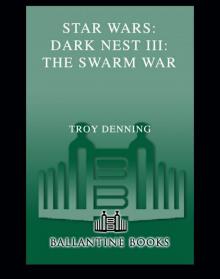 Star Wars 396 - The Dark Nest Trilogy III - The Swarm War
Star Wars 396 - The Dark Nest Trilogy III - The Swarm War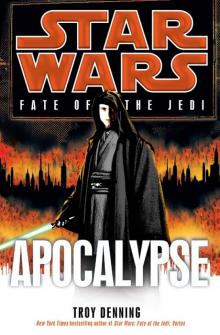 Star Wars: Fate of the Jedi: Apocalypse
Star Wars: Fate of the Jedi: Apocalypse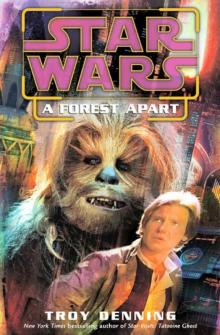 A Forest Apart
A Forest Apart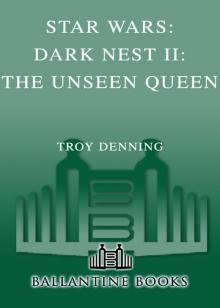 Star Wars: Dark Nest II: The Unseen Queen
Star Wars: Dark Nest II: The Unseen Queen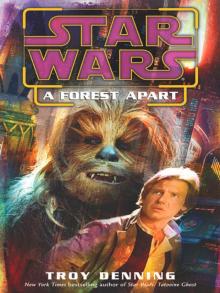 Star Wars: A Forest Apart
Star Wars: A Forest Apart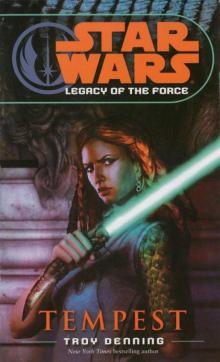 Tempest: Star Wars (Legacy of the Force) (Star Wars: Legacy of the Force)
Tempest: Star Wars (Legacy of the Force) (Star Wars: Legacy of the Force)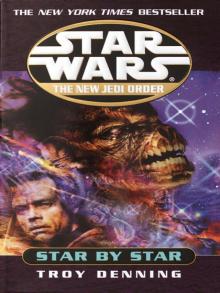 Star by Star
Star by Star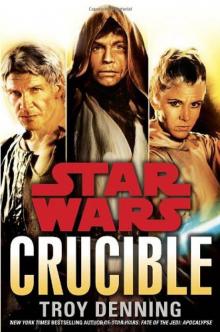 Crucible: Star Wars
Crucible: Star Wars Last Light
Last Light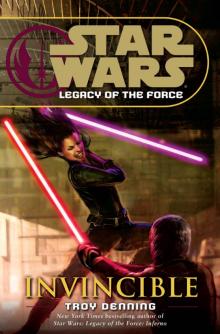 Invincible
Invincible Inferno
Inferno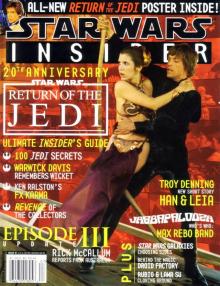 Star Wars - The Trouble With Squibs
Star Wars - The Trouble With Squibs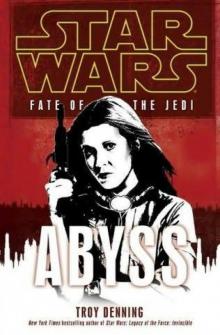 Abyss
Abyss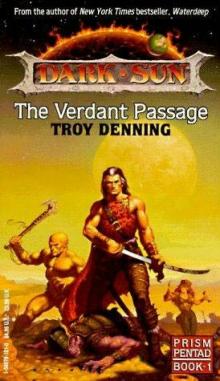 The Verdent Passage
The Verdent Passage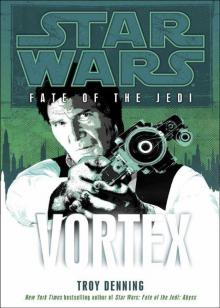 Vortex: Star Wars (Fate of the Jedi) (Star Wars: Fate of the Jedi)
Vortex: Star Wars (Fate of the Jedi) (Star Wars: Fate of the Jedi)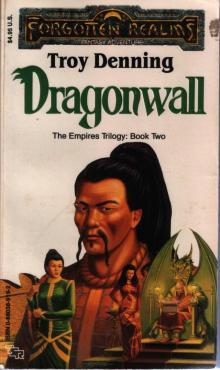 Dragonwall e-2
Dragonwall e-2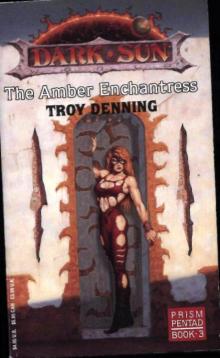 The Amber Enchantress
The Amber Enchantress Crucible
Crucible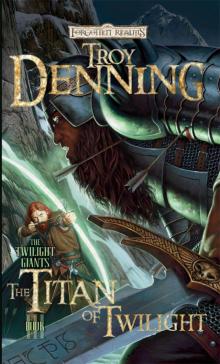 The Titan of Twilight
The Titan of Twilight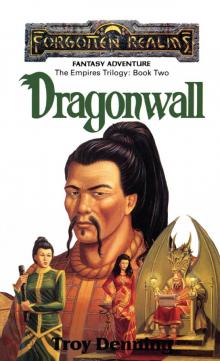 Dragonwall
Dragonwall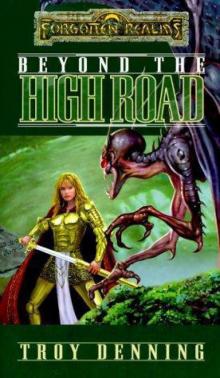 Beyond the High Road c-2
Beyond the High Road c-2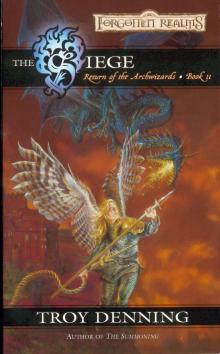 The Siege rota-2
The Siege rota-2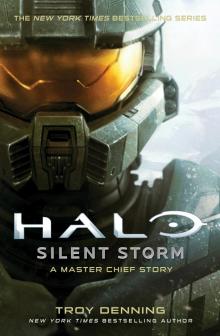 Silent Storm: A Master Chief Story
Silent Storm: A Master Chief Story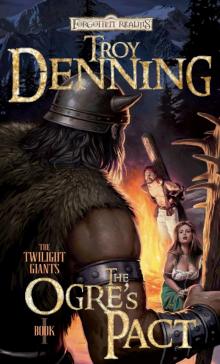 The Ogre's Pact
The Ogre's Pact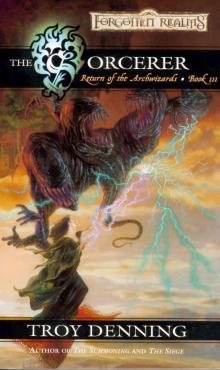 The Sorcerer rota-3
The Sorcerer rota-3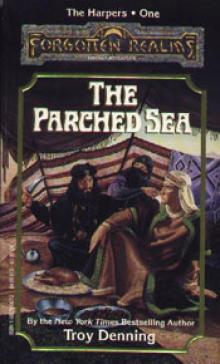 The Parched sea h-1
The Parched sea h-1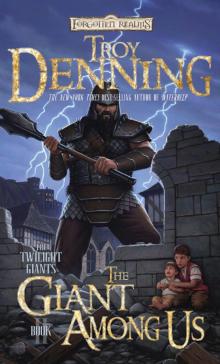 The Giant Among Us
The Giant Among Us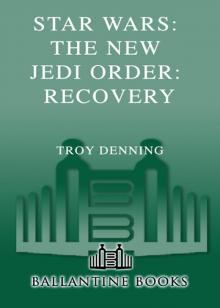 Recovery
Recovery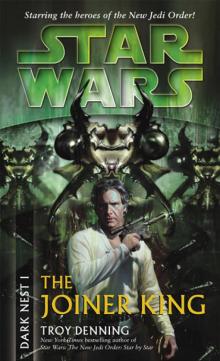 Star Wars: Dark Nest 1: The Joiner King
Star Wars: Dark Nest 1: The Joiner King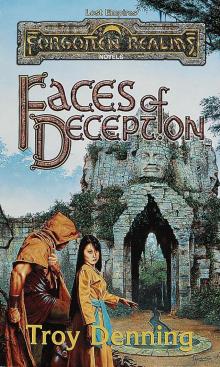 Faces of Deception le-2
Faces of Deception le-2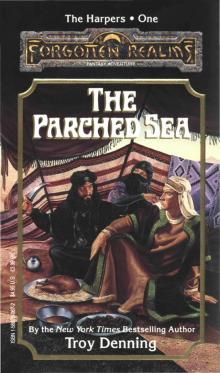 The Parched Sea
The Parched Sea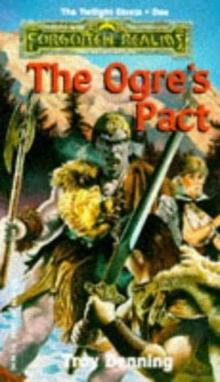 The Ogre's Pact зк-1
The Ogre's Pact зк-1 Apocalypse
Apocalypse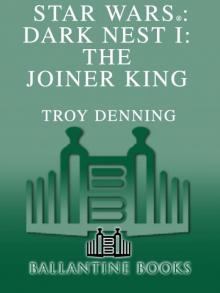 Star Wars®: Dark Nest I: The Joiner King
Star Wars®: Dark Nest I: The Joiner King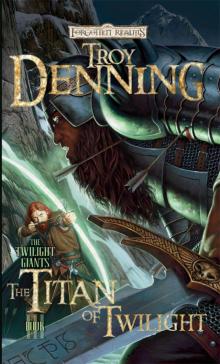 The Titan of Twilight ttg-3
The Titan of Twilight ttg-3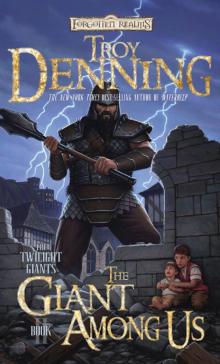 The Giant Among Us ttg-2
The Giant Among Us ttg-2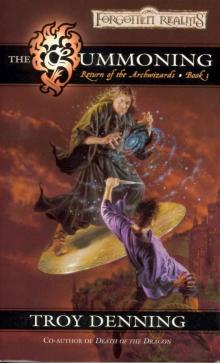 The Summoning rota-1
The Summoning rota-1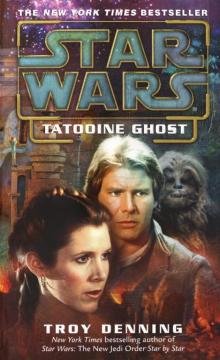 Tatooine Ghost
Tatooine Ghost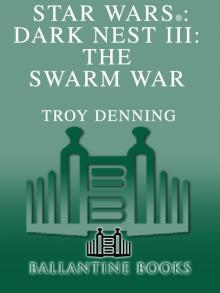 Star Wars®: Dark Nest III: The Swarm War
Star Wars®: Dark Nest III: The Swarm War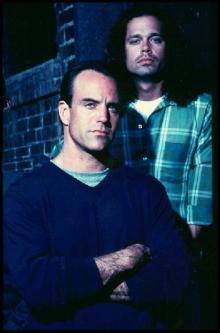 Retribution
Retribution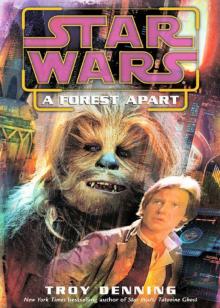 A Forest Apart: Star Wars (Short Story)
A Forest Apart: Star Wars (Short Story)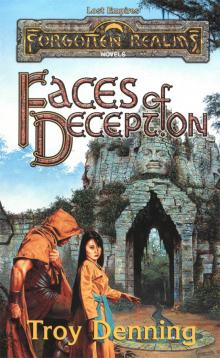 Faces of Deception
Faces of Deception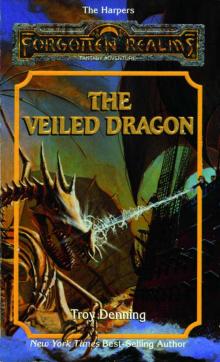 The Veiled Dragon h-12
The Veiled Dragon h-12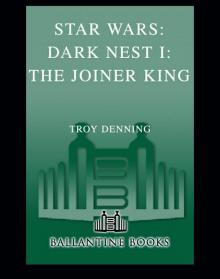 Star Wars 390 - The Dark Nest Trilogy I - The Joiner King
Star Wars 390 - The Dark Nest Trilogy I - The Joiner King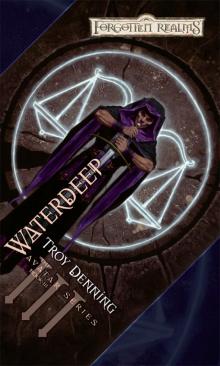 Waterdeep
Waterdeep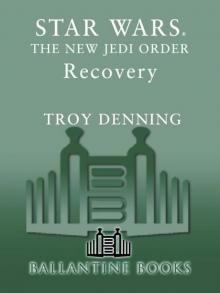 STAR WARS: NEW JEDI ORDER: RECOVERY
STAR WARS: NEW JEDI ORDER: RECOVERY